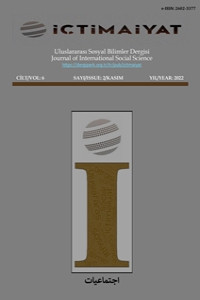Öz
Anahtar Kelimeler
Gender Roles Gender Equality Traditional Gender Roles Self-Esteem Married Women
Kaynakça
- Özkan, İ. (1994).Benlik saygısını etkileyen etkenler. Düşünen Adam, 7(3), 4-9. Tohumcu, M. U., Karslı, T. A., Bahadır, E., & Kalender, B. (2019). İnternet ve akıllı telefon bağımlılığı ile benlik saygısı ve yalnızlık arasındaki ilişkinin incelenmesi. Trakya Üniversitesi Sosyal Bilimler Dergisi. Tözün, M. (2010). Benlik saygısı. Actual Medicine, 18(7), 52-57. Vatandaş, Celalettin. (2011). Toplumsal cinsiyet ve cinsiyet rollerinin algılanışı. Istanbul Journal of Sociological Studie , 29-56. Yıldırım, Ş. (2016)., Toplumsal cinsiyet bağlamında kadına yönelik şiddet, sosyal politikanın cinsiyet halleri, Ed. Derya Şaşman Kaylı, & Fatih Şahin, Ankara: Nika,. 81-103. Zeyneloğlu, S., ve Terzioğlu, F. (2011). Toplumsal cinsiyet rolleri tutum ölçeğinin geliştirilmesi ve psikometrik özellikl
Öz
Anahtar Kelimeler
Cinsiyet Rolleri Cinsiyet Eşitliği Geleneksel Cinsiyet Rolleri Benlik Algısı Evli Kadın
Kaynakça
- Özkan, İ. (1994).Benlik saygısını etkileyen etkenler. Düşünen Adam, 7(3), 4-9. Tohumcu, M. U., Karslı, T. A., Bahadır, E., & Kalender, B. (2019). İnternet ve akıllı telefon bağımlılığı ile benlik saygısı ve yalnızlık arasındaki ilişkinin incelenmesi. Trakya Üniversitesi Sosyal Bilimler Dergisi. Tözün, M. (2010). Benlik saygısı. Actual Medicine, 18(7), 52-57. Vatandaş, Celalettin. (2011). Toplumsal cinsiyet ve cinsiyet rollerinin algılanışı. Istanbul Journal of Sociological Studie , 29-56. Yıldırım, Ş. (2016)., Toplumsal cinsiyet bağlamında kadına yönelik şiddet, sosyal politikanın cinsiyet halleri, Ed. Derya Şaşman Kaylı, & Fatih Şahin, Ankara: Nika,. 81-103. Zeyneloğlu, S., ve Terzioğlu, F. (2011). Toplumsal cinsiyet rolleri tutum ölçeğinin geliştirilmesi ve psikometrik özellikl
Ayrıntılar
| Birincil Dil | İngilizce |
|---|---|
| Konular | Sosyoloji |
| Bölüm | Orjinal Makale |
| Yazarlar | |
| Erken Görünüm Tarihi | 27 Kasım 2022 |
| Yayımlanma Tarihi | 30 Kasım 2022 |
| Gönderilme Tarihi | 11 Ekim 2022 |
| Yayımlandığı Sayı | Yıl 2022 Cilt: 6 Sayı: 2 |


